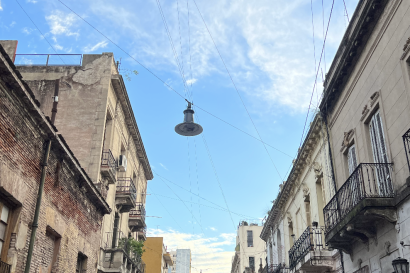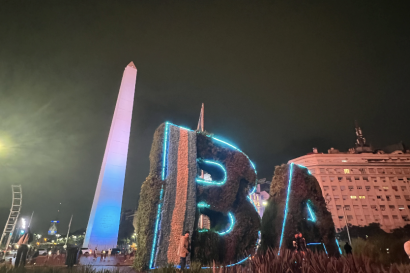This past week, I travelled to Chile, specifically the cities of Santiago and Valparaiso. The “spring” break was not only an opportunity to experience another South American culture, but also a time to reflect upon my experiences in Argentina.
When I first arrived in Santiago, I was surprised by the ethnic diversity within the city. I saw people of many different ethnicities, races, and nationalities—something that has been lacking during my time in Buenos Aires. One of the biggest differences between Chile and Argentina (besides the dialect and slang), is the presence of different ethnic groups and the indigenous influence on society. Throughout my time in Argentina, discussion of race and identity has always been a touchy subject (as it is in many places around the world). However, from my short time in Chile, I saw a culture that recognized and celebrated indigenous culture and history; for example, there are statues and artwork throughout the city of Santiago acknowledging the indigenous struggle, and certain slang terms used by Chileans derive from the Mapuche language. This felt like a stark contrast to Argentine culture as many times the indigenous struggle and founding of the nation is often overlooked, instead focusing on the strong ties to Europe. In many ways, Chile felt like a much less European-influenced country (though still heavily influenced by the United States). It’s a bit strange to think how different these two major metropolises could be when they are only a two-hour plane ride apart.
One other aspect of Chilean culture that peaked my interest was the recent Chilean history, specifically the military dictatorship from 1973 to 1990. I had visited the Museum of Human Rights and Memory, because when I mentioned I would be travelling to Santiago, nearly every person told me I needed to visit this specific museum. The museum focuses on the dictatorship and the acts of violence that occurred during this time—including personal accounts from survivors of torture and those that lived through dictatorship. The museum provided context and perspective to a period of Chilean culture that has continually shaped the country’s politics and social scape. Coming out of the museum, I wanted to know the details surrounding the last military dictatorship of Argentina. It was not until a couple of days ago that I learned that Buenos Aires has their own Museum of Human Rights, though now I will definitely make it a priority to visit.
I think the biggest thing I learned from my week away was how quickly the time has gone by. During the last couple of days of my trip, I found myself longing to go back “home”. In my mind, this is what Buenos Aires has become—a home. I have been living in the city for two months (which have flown by) and have managed to settle in, find a routine, and feel comfortable. However, there is still have so much to see and do with only two months left. Throughout these next couple of months, I am committing myself to using each day and being present in the moment (my weekly picnics have been a great start to this). I have learned so much from the city but I know there is still so much more to explore.

Elizabeth Azevedo
<p>Come one, come all on this adventure of a lifetime! I'm Elizabeth, known to many as Liz and Avocado by some. Originally from Northern California, I am currently studying Communication Studies and American Culture at the University of Michigan - Ann Arbor. I've decided to take my education beyond the bounds of the United States and head to Buenos Aires, Argentina!! Follow me along this journey as I navigate a new country and try to remember Spanish!</p>







